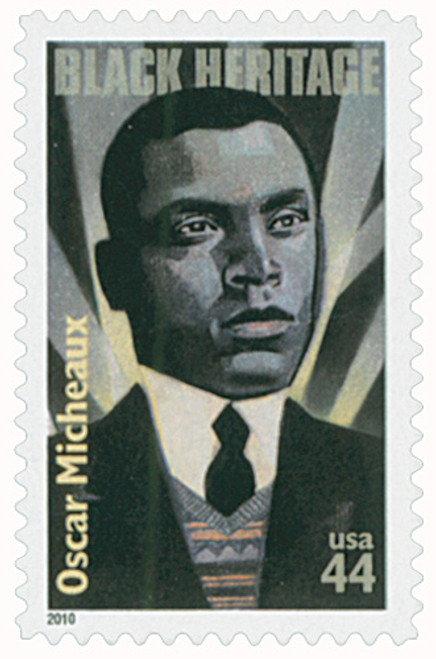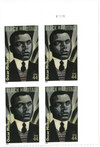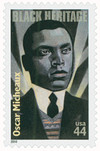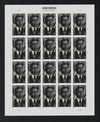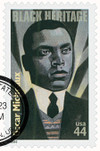
# 4464 - 2010 44c Black Heritage: Oscar Micheaux
Oscar Micheaux
Black Heritage Series
City: New York, NY
Birth Of Oscar Micheaux
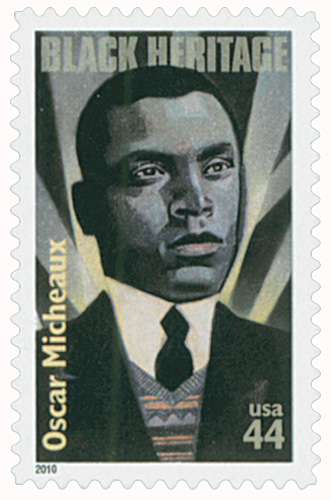
Author, director, and producer Oscar Devereaux Micheaux was born on January 2, 1884, in Metropolis, Illinois.
Micheaux was born on a farm, but his parents moved the family to a nearby city to give their children a better education. This was short-lived, however, as money troubles sent them back to the farm. Micheaux became restless and frequently got himself in trouble. As a result, his father sent him back to the city to do marketing.
Micheaux enjoyed his marketing work in the city – it allowed him to meet lots of people and develop social skills that would help in his later career. Micheaux moved to Chicago when he was 17 and worked a series of jobs in stockyards and steel mills. He eventually realized he wanted to be his own boss so he started his own business – a shoeshine stand in a barbershop. Micheaux then got a job as a Pullman porter for a railroad. He greatly enjoyed this job – he got to travel the country, meet lots of people, and make enough money to save a substantial amount.

After leaving his railroad job, Micheaux went to South Dakota and worked as a homesteader. The time he spent there provided ample inspiration for his subsequent books and movies. During this time, Micheaux also started submitting articles to local newspapers. He discovered his love of writing and decided to commit his time to that. He published his first book anonymously in 1913. It was largely based on his life as a homesteader.

In 1918, a movie studio showed interest in making Micheaux’s novel, The Homesteader, into a movie. The deal fell through because they didn’t want to give him direct involvement in the film. So Micheaux decided to start his own enterprise – the Micheaux Film & Book Company. He immediately set to adapting The Homesteader for film and it was generally well-received. The success of that film launched his career as a filmmaker.
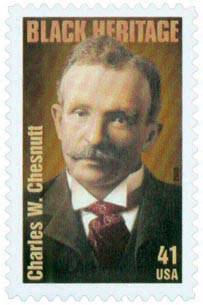
Micheaux’s movies were a radical departure from Hollywood. When D.W. Griffith portrayed the Ku Klux Klan as heroes in his film The Birth of a Nation, Micheaux responded by producing Within Our Gates – showing racial discrimination, lynching, and other white-on-black violence. He also moved away from the usual Hollywood stereotype of African Americans being servants or buffoons.
At a time when most black filmmakers were going bankrupt, Oscar Micheaux thrived. He worked tirelessly to keep his company afloat. To finance his films, Micheaux toured the country seeking advances from theater owners. In order to increase ticket sales, he convinced white theater owners to have special midnight showings for black audiences.
While many of the films he made were based on his own works, he also produced movies based on other writings. He made two movies based on the works of Charles W. Chesnutt – The Conjure Woman and The House Behind the Cedars.
Oscar Micheaux
Black Heritage Series
City: New York, NY
Birth Of Oscar Micheaux

Author, director, and producer Oscar Devereaux Micheaux was born on January 2, 1884, in Metropolis, Illinois.
Micheaux was born on a farm, but his parents moved the family to a nearby city to give their children a better education. This was short-lived, however, as money troubles sent them back to the farm. Micheaux became restless and frequently got himself in trouble. As a result, his father sent him back to the city to do marketing.
Micheaux enjoyed his marketing work in the city – it allowed him to meet lots of people and develop social skills that would help in his later career. Micheaux moved to Chicago when he was 17 and worked a series of jobs in stockyards and steel mills. He eventually realized he wanted to be his own boss so he started his own business – a shoeshine stand in a barbershop. Micheaux then got a job as a Pullman porter for a railroad. He greatly enjoyed this job – he got to travel the country, meet lots of people, and make enough money to save a substantial amount.

After leaving his railroad job, Micheaux went to South Dakota and worked as a homesteader. The time he spent there provided ample inspiration for his subsequent books and movies. During this time, Micheaux also started submitting articles to local newspapers. He discovered his love of writing and decided to commit his time to that. He published his first book anonymously in 1913. It was largely based on his life as a homesteader.

In 1918, a movie studio showed interest in making Micheaux’s novel, The Homesteader, into a movie. The deal fell through because they didn’t want to give him direct involvement in the film. So Micheaux decided to start his own enterprise – the Micheaux Film & Book Company. He immediately set to adapting The Homesteader for film and it was generally well-received. The success of that film launched his career as a filmmaker.

Micheaux’s movies were a radical departure from Hollywood. When D.W. Griffith portrayed the Ku Klux Klan as heroes in his film The Birth of a Nation, Micheaux responded by producing Within Our Gates – showing racial discrimination, lynching, and other white-on-black violence. He also moved away from the usual Hollywood stereotype of African Americans being servants or buffoons.
At a time when most black filmmakers were going bankrupt, Oscar Micheaux thrived. He worked tirelessly to keep his company afloat. To finance his films, Micheaux toured the country seeking advances from theater owners. In order to increase ticket sales, he convinced white theater owners to have special midnight showings for black audiences.
While many of the films he made were based on his own works, he also produced movies based on other writings. He made two movies based on the works of Charles W. Chesnutt – The Conjure Woman and The House Behind the Cedars.

